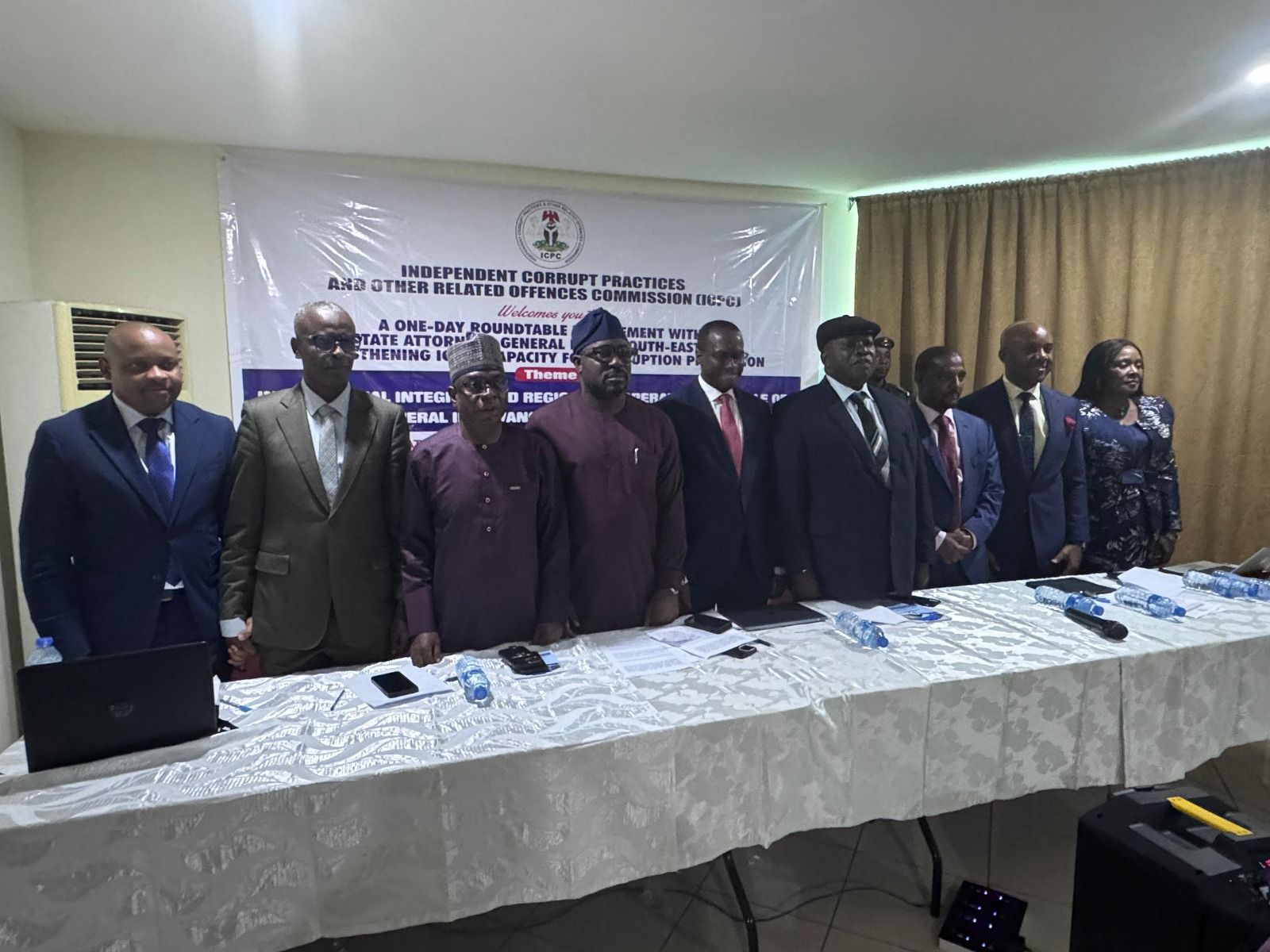by Clara Dabo
In a strategic push to enhance Nigeria’s anti-corruption efforts, the Independent Corrupt Practices and Other Related Offences Commission (ICPC) has convened a high-level roundtable engagement with State Attorneys-General from the South-East region.
The event, held in continuation of the Commission’s zonal engagements, focused on strengthening synergy between federal and state institutions in tackling corruption.
According to a statement by the Commission’s Director of Public Enlightenment and Education, Demola Bakare, the engagement is part of a nationwide initiative aimed at aligning anti-corruption strategies with regional peculiarities ahead of the Commission’s second National Anti-Corruption Summit later this year.
Delivering the keynote address, ICPC Chairman, Dr. Musa Adamu Aliyu, SAN, highlighted the importance of strategic collaboration in curbing corruption, especially through preventive mechanisms.
“This engagement is designed to deepen collaboration, enhance intelligence sharing, and align our strategies with both regional peculiarities and national priorities,” he said.
Dr. Aliyu opened his remarks with a tribute to the late former President Muhammadu Buhari, GCFR, who he described as a “moral compass” in Nigeria’s anti-corruption journey. Buhari was laid to rest the day before the roundtable.
Addressing a major point of friction in Nigeria’s anti-corruption landscape, Dr. Aliyu called attention to ongoing jurisdictional disputes between state and federal agencies. He referenced landmark Supreme Court rulings—AG Ondo v. AGF & 35 Ors (2002) and Kogi State & 18 Ors v. AGF (2024)—which affirm ICPC’s constitutional powers to investigate and prosecute corruption across all levels of government.
“It is counterproductive when state legal officers continue to challenge powers that have been affirmed by the highest court in the land,” the Chairman asserted. “As Chief Law Officers, your primary duty is to uphold the sanctity of Supreme Court decisions.”
He urged state Attorneys-General to move beyond legal rivalries and embrace their roles as advocates of justice, transparency, and good governance.
According to him, the Commission is pivoting toward a more preventive model of anti-corruption enforcement, emphasizing early intervention, education, and systemic reforms over litigation alone.
Also speaking at the event, former Attorney-General of Kano State, Dr. Ibrahim Mukhtar, stressed the devastating impact of corruption on Nigeria’s development.
“Corruption is not abstract. Its consequences are real and devastating from poverty to insecurity,” he stated.
Dr. Mukhtar proposed the establishment of state-level anti-corruption forums chaired by Attorneys-General and supported by the ICPC, civil society organizations, and relevant ministries. These forums, he said, would serve as think tanks to localize the anti-corruption fight and develop innovative solutions to community-specific challenges.
In a goodwill message, the Chairman of the Senate Committee on Anti-Corruption and Financial Crimes, Senator Emmanuel Udende, pledged the National Assembly’s full legislative support for subnational anti-corruption initiatives. He described the roundtable as “a strategic step in aligning federal vision with state-level commitment.
”“The fight against corruption cannot be won in isolation. State Attorneys-General must become frontline advocates of public trust and ethical governance,” Senator Udende said.
Echoing this sentiment, the Chairman of the House Committee on Anti-Corruption, Rt. Hon. Kayode Moshood Akiolu, reaffirmed the National Assembly’s commitment to supporting the ICPC. He emphasized the critical role of Attorneys-General in wielding their constitutional powers to prosecute corrupt actors.
“Corruption is the stone tied to our feet as we try to march toward development,” Akiolu declared. “We must untie it together.”
The roundtable marks a significant milestone in the ICPC’s efforts to build a unified, proactive, and locally responsive anti-corruption framework. With plans to extend similar engagements to other zones, the Commission is working toward a nationwide culture of transparency, accountability, and institutional cooperation.
